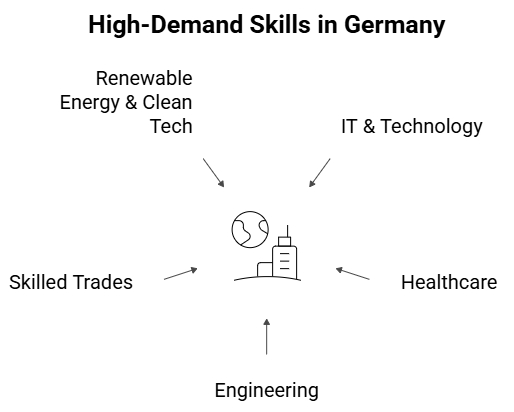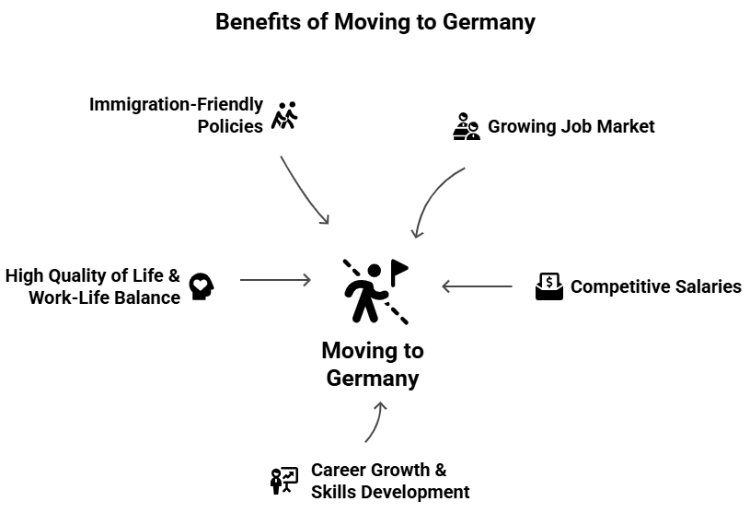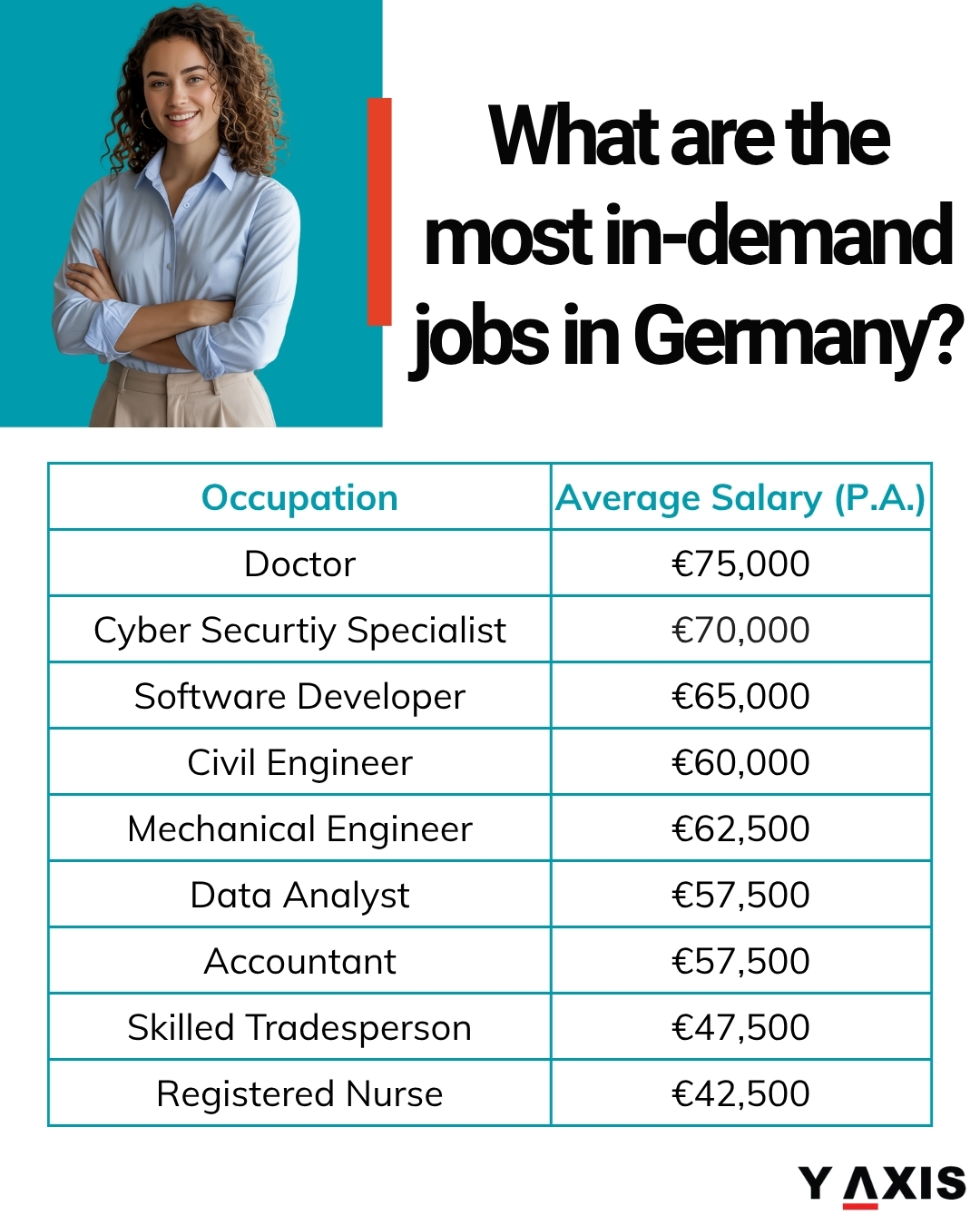Posted on October 30 2025
What are the most in-demand jobs in Germany?
By , Editor
Updated October 30 2025
Germany has a high demand for skilled professionals and will need 7 million skilled workers by 2035, due to the country's digital transformation, aging population, infrastructure expansion, and renewable energy projects.
The most in-demand jobs in Germany include software developers, data analysts, cybersecurity specialists, registered nurses, doctors, civil and mechanical engineers, electricians, accountants, and skilled tradespeople.
|
Occupation |
Average Annual Salary (EUR) |
|
Software Developer |
€65,000 |
|
Data Analyst |
€57,500 |
|
Cybersecurity Specialist |
€70,000 |
|
Registered Nurse |
€42,500 |
|
Doctor |
€75,000 |
|
Civil Engineer |
€62,500 |
|
Mechanical Engineer |
€62,500 |
|
Electrician |
€42,500 |
|
Accountant |
€57,500 |
|
Skilled Tradesperson |
€47,500 |
* Looking for high-paying jobs in Germany? Get complete job search assistance from Y-Axis professionals.
In-Demand Careers & Growing Sectors in Germany
Germany employment reached 45.8 million as of August 2025. The country is shortage of 7 million skilled workers by 2035 due to an aging population and declining birth rates.
There is high demand for skilled professionals across key sectors such as IT & Technology, Healthcare, Engineering, Skilled Trades, and Renewable Energy.
|
Sector |
Average Annual Salary (EUR) |
Top Employers |
|
IT & Technology |
€55,000 – €75,000 |
SAP, Siemens, Microsoft Germany, Google Germany, Amazon Germany |
|
Healthcare |
€40,000 – €75,000 |
Charité – Berlin, University Hospital Heidelberg, Helios Clinics, Asklepios |
|
Engineering |
€50,000 – €75,000 |
Bosch, BMW, Volkswagen, Siemens, Airbus |
|
Skilled Trades |
€35,000 – €55,000 |
Local construction firms, Elektroanlagen, Handwerkskammer |
|
Renewable Energy & Clean Tech |
€50,000 – €70,000 |
Siemens Energy, Ørsted, Vestas, EnBW, RWE Renewables |
1. IT & Technology
- Germany's push for digitalization has created high demand for IT professionals.
- Companies in software development, AI, cloud computing, and cybersecurity are hiring aggressively.
- In-Demand Roles: Software developers, data analysts, cybersecurity specialists, IT project managers
2. Healthcare
- Due to aging population and staff shortages in hospitals and care facilities make healthcare one of Germany's top sectors.
- Leading hospitals and healthcare providers are seeking international talent.
- In-Demand Roles: Registered nurses, doctors, medical technicians, home care assistants
3. Engineering
- Germany's industrial and infrastructure projects are driving strong demand for engineering professionals.
- In-Demand Roles: Civil engineers, mechanical engineers, electrical engineers, industrial engineers
4. Skilled Trades
- Infrastructure growth and industrial expansion creating high demand for skilled tradespeople.
- In-Demand Roles: Electricians, plumbers, carpenters, machine operators
5. Renewable Energy & Clean Tech
- Germany's transition toward renewable energy and climate-neutral goals is driving strong demand in the clean energy sector.
- In-Demand Roles: Electrical engineers, project managers, renewable energy technicians, sustainability specialists
Best Cities to Find Jobs in Germany
Germany offers several cities with strong career opportunities for skilled professionals and each city has its own industry strengths, salary standards, and lifestyle benefits.
Choosing the right city can significantly influence your career growth, access to top employers, and overall quality of life.
|
City |
Key Sectors |
Why Consider This City? |
|
Berlin |
IT & Technology, Healthcare, Creative Industries |
Hub for tech startups, digital innovation, and healthcare jobs. |
|
Munich |
Engineering, IT & Technology, Automotive |
Global leaders in automotive and engineering; high salaries. |
|
Frankfurt |
Finance, IT & Technology, Engineering |
Financial and tech centre with growing career opportunities. |
|
Hamburg |
Renewable Energy, Shipping, Engineering |
Leader in renewable energy, shipping, and industrial projects. |
|
Stuttgart |
Automotive, Engineering, IT |
Heart of automotive and manufacturing industries. |
|
Cologne |
Healthcare, IT & Technology, Media |
Diverse economy with tech, healthcare, and media roles. |
|
Düsseldorf |
IT & Technology, Finance, Healthcare |
Strong business, finance, and IT opportunities. |
High-Demand Skills for Working in Germany
Germany’s growing economy and evolving industries are creating strong demand for professionals with both technical expertise and soft skills. Developing the right skills can significantly improve your chances of securing a high-paying job and advancing your career.
1. IT & Technology
- Proficiency in software development, data analytics, cybersecurity, and cloud computing is highly sought after.
- Employers also value problem-solving, project management, and adaptability as companies expand digital transformation, AI, and automation initiatives.
2. Healthcare
- Healthcare professionals need clinical expertise, patient care skills, and medical knowledge.
- Strong communication, teamwork, and organizational skills are critical in hospitals, clinics, and elderly care facilities.
3. Engineering
- Engineers in Germany require technical knowledge in civil, mechanical, electrical, or industrial engineering.
- Employers also look for project management, problem-solving, and innovation skills to support infrastructure, manufacturing, and automotive projects.
4. Skilled Trades
- Skilled tradespeople need hands-on technical skills in plumbing, electrical work, carpentry, and machinery operation.
- They also need precision, safety awareness, and efficiency to meet the demands of construction and industrial sectors.
5. Renewable Energy & Clean Tech
- Professionals in clean energy require knowledge of renewable energy systems, sustainability, and environmental technologies.
- Employers value project management, innovation, and teamwork for roles in wind, solar, and energy efficiency projects.

How to Get a Job in Germany from UAE?
Finding a job in Germany from UAE can seem challenging, but with the right preparation, you can significantly improve your chances of securing a high-demand role.
Steps to Secure a Job in Germany:
Step 1: Research the German Job Market
- Focus on high-demand sectors such as IT & Technology, Healthcare, Engineering, Skilled Trades, and Renewable Energy.
- Check the German Federal Employment Agency (Bundesagentur für Arbeit) and company websites to identify open positions and required qualifications.
- Review job descriptions, skills required, and average salaries before applying.
Step 2: Create a German-Style CV and Cover Letter
- Tailor your CV to German standards, highlighting your education, certifications, and relevant work experience.
- Include a clear cover letter explaining your interest in the role and readiness to relocate from UAE.
Step 3: Search for Jobs on Trusted Portals
- Use platforms like LinkedIn Germany, StepStone, Indeed Germany, and official company career pages.
- Apply to companies offering work visa sponsorship for international candidates.
Step 4: Network and Apply for Opportunities
- Join LinkedIn groups, professional associations, and recruitment agencies that specialize in hiring international talent.
- Look for employers who can sponsor visas and highlight your availability and readiness to move to Germany.
Step 5: Prepare for Online Interviews
- Familiarize yourself with German workplace culture and communication style.
- Practice both technical and behavioural questions to make a strong impression.
*Germany is hiring skilled professionals – Y-Axis helps you secure top in-demand jobs with complete support.
Immigration Pathways to Work in Germany
Germany offers several pathways for skilled professionals from UAE who want to live and work in the country. These programs are designed for highly skilled workers, professionals in shortage occupations, and international talent looking to contribute to Germany’s economy.
Main Immigration Pathways for Job Seekers in Germany are:
1. EU Blue Card
- For highly skilled professionals with a recognized degree and a confirmed job offer in Germany.
- Applicants must meet the minimum salary requirement.
- Leads to long-term residency and permanent settlement.
2. Skilled Workers Visa (Fachkräftevisum)
- It is designed for professionals with vocational qualifications in shortage occupations, including IT, healthcare, engineering, and skilled trades.
- Applicants must have a confirmed job offer from a German employer.
- Eligible for permanent residence after 5 years of employment.
3. Opportunity Card (Chancenkarte)
- Allows skilled professionals from UAE to enter Germany without a job offer and search for employment locally.
- Eligibility requires recognized qualifications, basic German (A1) or English (B2), and proof of sufficient funds.
- During the job search, part-time work (up to 20 hours/week) and two-week trial jobs are allowed.
- Upon securing a job, holders can transition to a residence permit leading to permanent residency.
Step-by-Step Process to Move to Germany from UAE
Germany is actively seeking skilled professionals in sectors such as IT & Technology, Healthcare, Engineering, and Skilled Trades. Professionals from UAE can move to Germany through approved work visas and immigration programs.
Application process to move to Germany from UAE:
Step 1: Secure a Job Offer (if required)
- Obtain a confirmed job offer from a German employer for EU Blue Card or Skilled Workers Visa.
- Ensure your job meets the salary threshold and visa eligibility requirements.
Step 2: Choose the Right Visa Pathway
- Determine the right visa: EU Blue Card, Skilled Workers Visa (Fachkräftevisum), or Opportunity Card.
- Check your eligibility criteria such as occupation, experience, qualifications, and language skills.
Step 3: Apply for a German Work Visa
- Submit the visa application online through the official German Visa portal.
- Schedule an appointment at the German Embassy in Abu Dhabi or Consulate General in Dubai to submit biometric data and documents.
- Attend the appointment with all required documents (job contract, CV, certificates, proof of funds).
- Pay the visa fee and complete any additional requirements.
Step 4: Complete Medical Exams and Biometrics
- You must undergo medical checks and provide biometric information as required by the visa application.
Step 5: Receive Visa Approval
- Wait for confirmation of your visa application. Once approved, you can start planning your relocation.
Step 6: Plan Your Relocation
- Arrange housing, banking, health insurance, and registration at the local residents’ office (Einwohnermeldeamt).
- Prepare for any professional licensing or registration required for your occupation in Germany.
Step 7: Arrive in Germany and Begin Work
- Travel to Germany and complete mandatory registrations such as residence permit and social security.
- Start your employment while complying with all German visa and labour regulations.
Is It Worth Moving to Germany?
Yes, moving to Germany offers significant opportunities for skilled professionals in high-demand sectors. Germany has strong employment growth across key industries, competitive salaries, career advancement, and a high standard of living.
1. Growing Job Market
- Germany is shortage of 7 million skilled workers by 2035, creating job opportunities across key sectors in IT & Technology, Healthcare, Engineering, and Skilled Trades.
2. Competitive Salaries
- Many roles in key sectors offer €36,000–€60,000+ annually, with IT, engineering, and healthcare positions providing the highest earning potential.
3. Career Growth & Skills Development
- Occupations such as software developers, data analysts, nurses, doctors, engineers, electricians, accountants, and skilled tradespeople are projected to see the largest increases in demand.
4. High Quality of Life & Work-Life Balance
- Germany offers a robust healthcare system, excellent education, modern infrastructure, and generous vacation leave.
5. Immigration-Friendly Policies
- Programs like the EU Blue Card, Skilled Workers Visa (Fachkräftevisum), and Opportunity Card make it easier for UAE professionals to live and work in Germany.
- These pathways can lead to permanent residency, providing long-term stability and career opportunities.

Job Outlook for Germany
Germany’s job market is steadily expanding, with strong demand across key sectors such as IT & Technology, Healthcare, Engineering, and Skilled Trades. By 2035, Germany is set to create of 7 million jobs, creating excellent opportunities for skilled professionals.
With competitive salaries, structured career paths, and a high standard of living, Germany continues to attract international talent from around the world.
With over 25 years of experience, Y-Axis, a leading overseas immigration consultancy, has helped thousands of skilled professionals from UAE successfully to find jobs, connect with top German employers, and settle confidently in Germany.
Our Job Search Services include:
- Resume Writing – Craft a professional CV that meets German standards.
- LinkedIn Optimization – Enhance your profile to attract recruiters and German employers.
- Job Application Assistance – Apply for roles on your behalf across German job portals and employer networks.
Explore top career opportunities in Germany and start your journey with Y-Axis today!
FAQs
1. What are the most in-demand jobs in Germany?
The most in-demand jobs in Germany include software developers, engineers, healthcare professionals, data analysts, and skilled tradespeople. Germany faces a shortage of over 7 million skilled workers by 2035, creating strong demand across technology, engineering, and healthcare sectors.
Jobs in renewable energy, artificial intelligence, logistics, and construction are also growing rapidly. Skilled professionals can find excellent opportunities to work in Germany. Programs like the Skilled Worker Visa and Opportunity Card make it easier to secure these in-demand jobs.
2. Why is there a high demand for skilled workers in Germany?
Germany’s aging population, digital transformation, and expanding infrastructure projects are key reasons for the rising demand for skilled workers. The German job market urgently needs professionals in healthcare, engineering, and IT to sustain economic growth.
As many older employees retire, there’s a shortage of qualified young professionals. The government’s Skilled Immigration Act and the Germany Opportunity Card aim to attract international talent to fill these gaps.
3. Which sectors offer the most job opportunities in Germany?
The top sectors with job opportunities in Germany are IT, healthcare, engineering, renewable energy, manufacturing, and logistics. With a focus on sustainability and automation, roles like software developers, mechanical engineers, and medical professionals are in high demand.
Skilled professionals with technical or healthcare expertise are highly valued. Jobs in finance, data science, and green technology are also growing. These sectors offer stable, well-paying employment and long-term residency prospects through Germany’s Skilled Worker Visa program.
4. Are IT professionals in demand in Germany?
Yes, IT professionals are highly in demand in Germany. The tech industry is rapidly growing due to digitalization, AI, and cybersecurity needs. Roles like software developers, cloud engineers, data scientists, and cybersecurity experts are particularly in demand.
Startups and global companies offer competitive salaries and visa sponsorships. Programs like the Germany Opportunity Card make it easier for IT professionals from abroad to enter the German job market. While strong English skills are often sufficient, learning German can further enhance your career opportunities and integration.
5. What healthcare jobs are most needed in Germany?
Germany has high demand for healthcare professionals, especially nurses, doctors, physiotherapists, and elderly care specialists. Due to an aging population and growing healthcare demand, there are major staff shortages in hospitals and care facilities. International medical staffs with recognized qualifications are highly valued.
Programs such as the Germany Skilled Worker Visa simplify work and residence procedures for foreign professionals. Learning German is essential for most healthcare roles to communicate effectively with patients. The healthcare sector offers secure, well-paying, and rewarding opportunities across Germany’s expanding medical network.
6. Is Germany hiring engineers from abroad?
Yes, Germany is actively hiring engineers from abroad to address labour shortages across key industries. Mechanical, civil, electrical, and automotive engineers are in high demand due to infrastructure and renewable energy projects. International engineers with recognized qualifications and practical experience can apply for the Germany Skilled Worker Visa or Opportunity Card.
Engineering jobs in Germany offer competitive pay, strong job security, and pathways to permanent residency. With its robust manufacturing base and innovation-driven economy, Germany remains one of the top destinations for engineers worldwide.
7. Are skilled trades and technical workers in demand in Germany?
Yes, skilled trades and technical workers are in high demand in Germany, especially electricians, plumbers, welders, mechanics, and construction technicians. The industrial sector and housing expansion projects require thousands of qualified professionals.
Germany’s dual education system values hands-on experience, making foreign skilled workers with certifications highly sought after. Programs like the Opportunity Card and Skilled Worker Visa allow tradespeople to live and work in Germany legally. These roles offer strong job stability, good pay, and a clear pathway to permanent residence and long-term career growth.
8. Can foreign professionals apply for in-demand jobs in Germany?
Yes, foreign professionals can apply for in-demand jobs in Germany through the Skilled Worker Visa or Opportunity Card. Applicants should have recognized qualifications and relevant work experience in fields like IT, engineering, or healthcare.
Germany welcomes skilled professionals from non-EU countries to address labour shortages across key sectors. Once employed, individuals can later apply for permanent residency or citizenship. With high demand and supportive immigration policies, working in Germany offers excellent career opportunities and lifestyle benefits.
9. What qualifications are required for in-demand jobs in Germany?
To work in Germany, foreign professionals need a recognized qualification, such as a degree, diploma, or vocational certificate. For many in-demand roles, qualifications must be officially recognized by German authorities (Anerkennung).
English may be sufficient for some tech and research positions, but having German skills significantly improves employment prospects. Relevant experience in IT, healthcare, or engineering is highly valued. Applicants for the Germany Skilled Worker Visa or Opportunity Card must also meet specific skill, education, and salary requirements set by immigration authorities.
10. How can I find and apply for in-demand jobs in Germany?
You can find and apply for in-demand jobs in Germany through online portals, company applications, and visa programs for skilled professionals.
Steps to Apply:
- Use job portals like Make it in Germany, LinkedIn, StepStone, or the Federal Employment Agency.
- Apply directly to companies or via international recruitment programs.
- Apply for a Germany Skilled Worker Visa or Opportunity Card to simplify relocation.
- Prepare a German-style CV and learn basic German to improve chances.
- After securing a job, complete the visa process and plan relocation.
Tags:
Germany Jobs
Germany Work Visa
EU Blue Card
Germany Skilled Worker Visa
Opportunity Card
In-Demand Occupations in Germany
German Job Market
Share
Y-Axis Services
Get it on your mobile
Get News alerts
Contact Y-Axis
